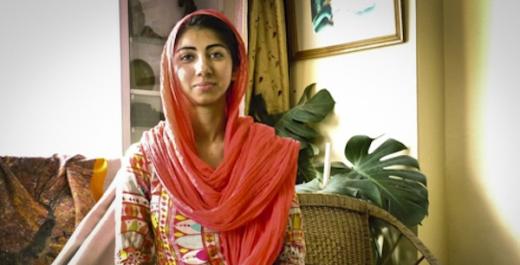
SRINAGAR, INDIAN-ADMINISTERED KASHMIR – When Mahvash Masood, 27, looks at one of the pashmina shawls that she designed, she sees the beauty of Kashmir, she says.
The scenic beauty of the Kashmir Valley inspires her to produce innovative and handmade Kashmiri crafts for Farzeen, a designer brand she created four years ago. She also aims to modernize local handicrafts so they match international fashion and sales trends.
“We are inclined to use traditional techniques and experiment with material, motifs and product designs to create a range of products that can be used as per the trend,” Masood says.
Masood attained a postgraduate degree from the Craft Development Institute, which offers professional educational programs for young people who seek careers and entrepreneurial opportunities in the handicraft sector. One of her favorite things about being an entrepreneur is the opportunity to help people, she says.
As the CEO of Farzeen, she operates a unique entrepreneurial model that employs more than 100 skilled artisans on a freelance basis at different stages of production. Masood works with local artisans in Srinagar, the summer capital of Jammu and Kashmir state, to create innovative pottery, pashminas, sozni embroidery – a type of Kashmiri needlework – willow basketry, papier-mâché, and crafts made from walnut wood and copper.
“Since my childhood, I liked to experiment and make innovative things,” Masood says. “As I grew up, I realized there is a lot of potential in various crafts and [a] lot can be done with them.”
The handicraft industry is a major source of livelihood in Kashmir and a significant contributor to its economy.
After declining for two years, exports of handicraft goods jumped from 6.6 billion Indian rupees ($102.5 million) in the 2009 to 2010 fiscal year to 16.4 billion rupees ($256 million) in the 2011 to 2012 fiscal year, according to the state government’s 2012 to 2013 economic survey. During the same two-year period, production of local handicrafts increased from 10 billion rupees ($156 million) to 18.2 billion rupees ($284 million).
The local crafts give Kashmir a positive identity at the global level and create employment at the local level, Masood says.
“Due to more than two decades of conflict in Kashmir, the shrinking job market has forced many unemployed youth to [sell] machine-made products sold in the name of handmade products,” she says. “The trend has not only earned a bad name for the traditional handicraft industry but has also limited the market of artisans who are currently producing handicrafts in Kashmir and has also turned most of the artisans out of work.”
So Masood set out to create a new model that would produce beautiful crafts and empower local artisans.
Most artisans earn hourly wages, which is not fair to them and does not yield high-quality products, Masood says. Instead, Farzeen compensates artisans based on their skills, which decline when they are under pressure to work too quickly.
“The products that we make can only be done by skilled craftsmen whom we pay on the basis of skill rather than the time,” she says.
Masood pays artisans between 300 rupees ($4.75) and 1,000 rupees ($15) a day and even sometimes more depending on the quality of the crafts, she says. She negotiates the rates with the artisans based on the kinds of projects and the work and skill they require.
Farzeen aims to empower local craftsmen and to encourage them to stay true to the handmade tradition, which promotes quality and creates more job opportunities.
“A simple, machine-made embroidered shawl doesn’t employ more than two employees at the most in its making,” Masood says. “But we at least involve about six people to do the same, ranging from preparing the yarn to its finishing till the end product is made.”
Shabir Ali Beigh, known locally as a master craftsman of sozni embroidery, says in a phone interview that the work he receives from Masood is unlike any he has ever done before.
“She has the capability to inspire us to do something new,” he says.
He has to retrain fellow artisans who have been doing traditional handicrafts for years to focus on quality instead of speed when they work for Farzeen.
“At Farzeen, everyone works as a team,” he says.
Artisans who work for him receive consistent work from Farzeen thanks to their creativity and hard work, he says.
Clients also appreciate Farzeen’s work. Masood initially built Farzeen’s brand by taking large corporate orders.
One of Farzeen’s corporate clients is Piramal Enterprises Ltd., a health care, life sciences and financial services company in Mumbai, India’s commercial capital. Farzeen has created gifts and souvenirs for the winners of the company’s golf tournaments, says Rashmi Bhatnagar, the company’s chief manager.
“In 2009, she showed the company some of her work, and then they decided to give her an opportunity to work with them,” Bhatnagar says in a phone interview from Mumbai. “She created pashmina stoles and woolen scarves, men’s scarves, silken ties with Kashmiri embroidery with golf motifs for our 2010 tournament.”
The positive responses to Farzeen’s products were overwhelming, Bhatnagar says. Those who attended the golf tournament recommended Masood’s name for other corporate events.
Farzeen’s products are expensive, but the company values the quality and innovation of the handmade crafts, Bhatnagar says.
“We never bothered to check the market rates of her products as we were happy with the work,” she says. “Her work was unique that you could not find in the market.”
Masood declined to give the prices of Farzeen’s products, which she currently sells to select clients across various platforms. But beginning this fall, Masood will open Farzeen retail outlets in Kashmir and throughout India, she says.
Masood also plans in September to launch Skill Up, a monthlong program through Farzeen that will teach 10 women how to improve their skills and will educate them about the handicraft business. Seven women have enrolled so far in the program.






